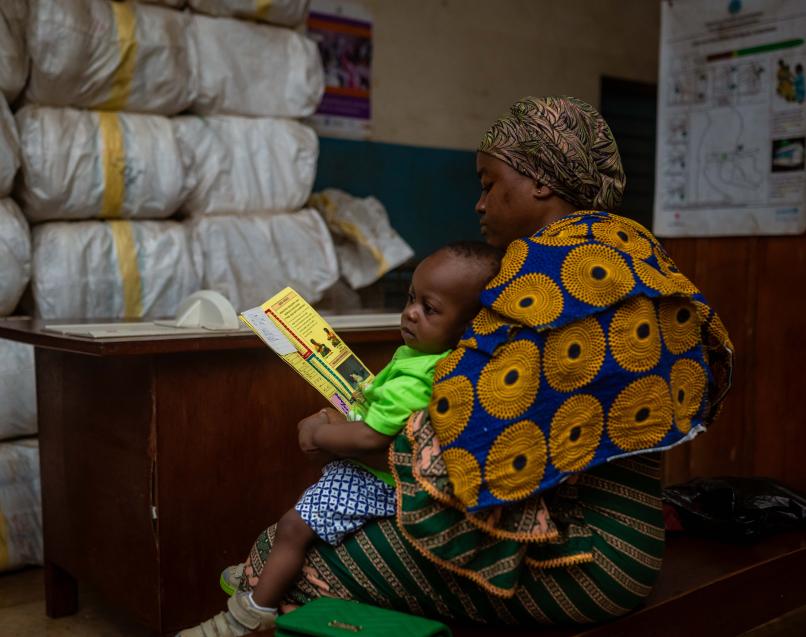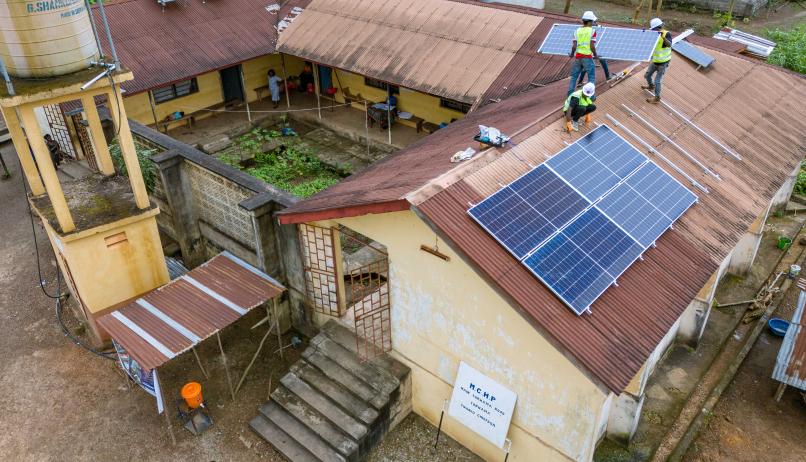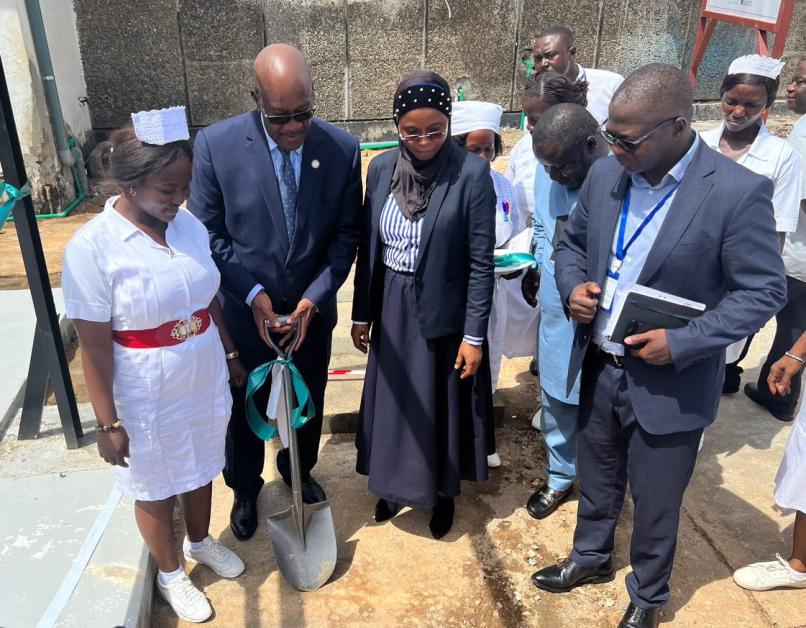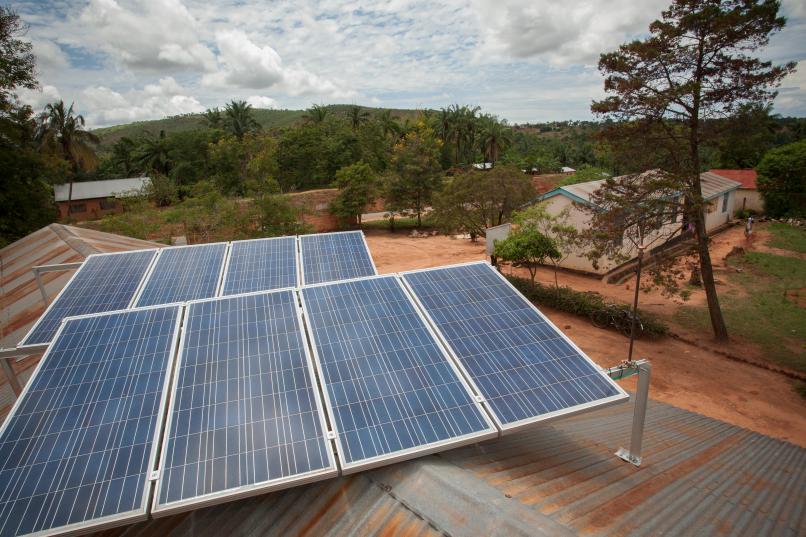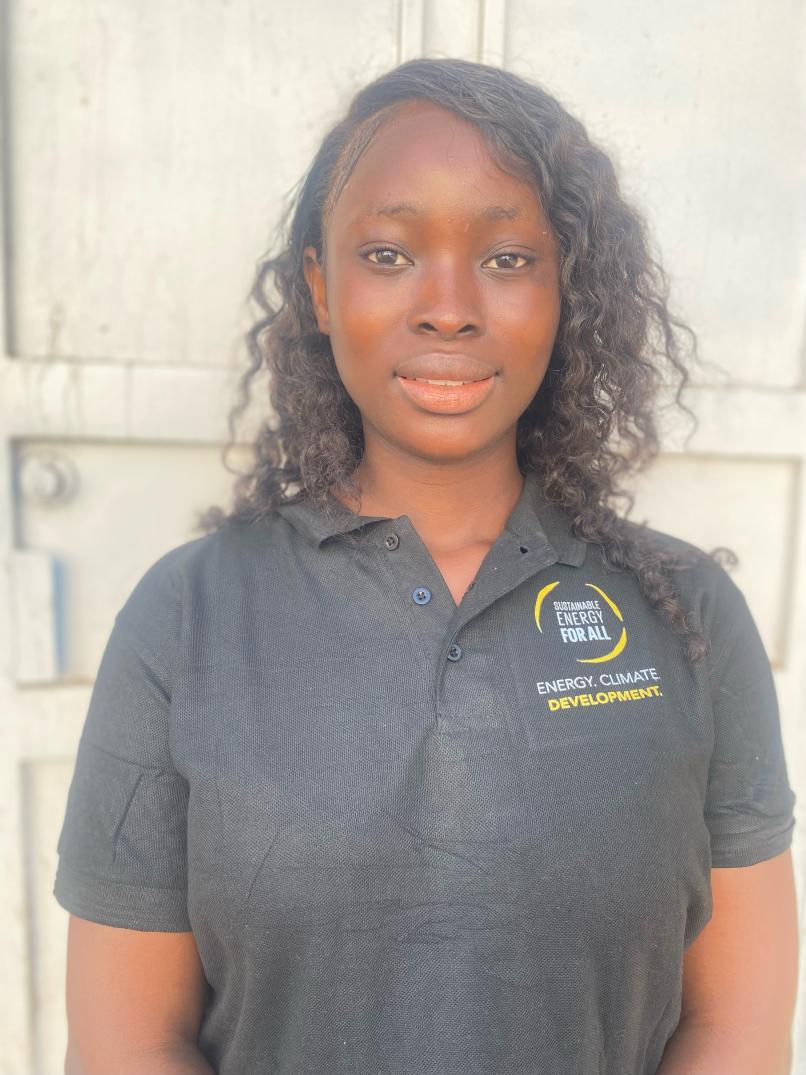SOGREA Initiative Launches €22 Million Investment Facility to Accelerate Green Mini-Grid Deployment in Sierra Leone
SOGREA is partnering with the Government of Sierra Leone and the private sector to unlock new investments that will expand electricity access through green mini-grids, accelerating progress toward the country’s universal energy access goals.
Freetown, 21 October 2025: The Salone Off-Grid Renewable Energy Acceleration (SOGREA) Initiative today officially launched its Investment Support Windows, a crucial mechanism set to catalyse private sector investment in Green Mini-Grids (GMGs).
Funded by the European Union (EU) and implemented by the United Nations Office for Project Services (UNOPS), with its hosted entity Sustainable Energy for All (SEforALL), in partnership with the Government of Sierra Leone (GOSL), the initiative features an indicative total of €22 million in catalytic investment support incentivizing private developers/operators to develop, finance, build, own, and operate mini-grids across rural Sierra Leone. This funding is aimed directly at supporting the Government of Sierra Leone’s drive towards financially sustainable electrification of the country’s rural areas by attracting new private investments into the GMG sector.
The SOGREA Milestone-triggered CapEx Investment Support provides partial financial support to private entities to cover a portion of the Capital Expenditure (CAPEX) for developing new GMGs and upgrading existing ones. This investment is designed not only to expand connections but also to help reduce electricity tariffs. Thanks to the Government of Sierra Leone’s reforms of the mini-grid sector by introducing state-of-the-art mini-grid regulations and a robust mechanism for tariff setting, SOGREA investment support will simultaneously help to bridge the gap between the tariffs that would be needed to cover the cost of supplying mini-grid energy and the tariffs that households can afford.
The GOSL views this investment as central to creating a conducive, sustainable environment for private sector engagement, emphasising that clear, simple and reliably enforced regulations are critical to attracting both donor and private capital for accelerated electrification.
Dr Kandeh Yumkella, Chairman of the Presidential Initiative on Climate Change, Renewable Energy and Food Security (PI-CREF), and Chairman Energy Governance Coordination Group (EGCG): "This €22 million investment support marks a pivotal moment in our drive toward universal energy access. It provides the necessary leverage to unlock significant private sector capital. By lowering the investment risk and ultimately reducing the tariff burden on our citizens, we are not just lighting up homes; we are powering economic growth and social development. The GOSL is fully committed to the success of this transparent and impact-focused partnership."
Ambassador Jacek Jankowski, Head of the EU Delegation in Sierra Leone, said: “The European Union is proud to support the SOGREA Initiative, which aligns perfectly with our commitment to sustainable development, universal energy access, and climate action. The SOGREA Investment Support directly addresses the critical financing gap for green mini-grids, which are crucial for providing energy access in remote and underserved communities. This targeted grant support is a wise investment that will help Sierra Leone develop a resilient, decentralised, and clean energy future for its citizens.”
Crucially, the investment operates under a rigorous reimbursement mechanism. Payments are strictly tied to the achievement of specific, predetermined milestones such as "Equipment arrives on site," "GMG commissioned," and "GMG certified to operate", ensuring high standards and accountability. This phased payment approach is supported by verification from reputable third-party service providers and on-site checks, confirming progress before any funds are released.
Silvia Gallo, UNOPS West Africa Multi-Country Office Director, stated: “UNOPS is committed to the transparent and efficient administration of the SOGREA investments. Our system of phased, milestone-triggered payments, alongside robust third-party and on-site verification, promotes accountability and ensures that public funds deliver maximum impact. We are utilising systems, including SEforALL’s UEF web-based IT portal, to monitor progress, verify connections via smart meters, and uphold the integrity and credibility of the entire project.”
The initiative builds on the success of prior projects, highlighting the power of robust public-private partnerships in delivering tangible results, and focuses on both infrastructure development and strengthening the governance and financing of the renewable energy sector.
Anita Otubu, Senior Director of the Universal Energy Facility, Sustainable Energy for All: “Through the integration of the Universal Energy Facility (UEF) funding windows into SOGREA, SEforALL is extending its proven model for accelerating energy access. The UEF's operating procedures and secure IT portal will ensure a streamlined and transparent process for private sector partners. This collaboration is designed to scale up the deployment of quality green mini-grids infrastructure quickly, bringing power to grassroots communities and transforming lives in Sierra Leone.”
Communities and civil society are the critical beneficiaries and stakeholders who ensure inclusivity for youth, women, and vulnerable groups. But the lights won't stay on without capital. Private Sector companies are encouraged to invest now in Sierra Leone's green mini-grids to drive sustainable energy access, unlock rural economic growth, and secure an inclusive, electrified future. Green mini-grid investment is the spark that powers national development.
Note to Editors
BOILERPLATE
The Salone Off-Grid Renewable Energy Acceleration (SOGREA) initiative supports Sierra Leone’s transition to clean, affordable, and reliable energy by strengthening governance, scaling investments in mini-grids, and piloting innovative renewable energy solutions. SOGREA is funded by the European Union (EU) and implemented by UNOPS in close collaboration with the Government of Sierra Leone (GoSL) and Sustainable Energy for All (SEforALL).
MEDIA CONTACTS
The Presidential Initiative on Climate Change, Renewable Energy and Food Security (PI-CREF): Anthony Kamara, Director of Partnerships, Communications and Outreach akkamara@statehouse.gov.sl | +232 78 107 303
Delegation of the European Union to Sierra Leone: N’fa Alie Koroma, Political Press & Information Officer N'Fa-Alie.KOROMA@eeas.europa.eu | +232 88 136 002
UNOPS: Victoria Chendeka - Communications Officer, UNOPS Sierra Leone Victoriak@unops.org | +23230882151
Sustainable Energy for All and the Universal Energy Facility: Sherry Kennedy, Director of Communications: Sherry.Kennedy@SEforALL.org | +43 676 486 2425
About PI-CREF
The Presidential Initiative on Climate Change, Renewable Energy and Food Security (PI-CREF) plays a critical role in guiding and coordinating efforts to address the impacts of climate change, catalyse universal access to sustainable and affordable energy, and improve food and nutrition security in the country.
About the European Union Delegation to Sierra Leone
The European Union and its Member States are committed to supporting Sierra Leone’s transition to a sustainable energy future. Through the Development Partnership and the Multiannual Indicative Programme for 2021-2027, the EU focuses on providing access to affordable, reliable, and modern energy services. This initiative aims to drive inclusive economic growth, create decent jobs, and promote the adoption of sustainable energy sources, fostering a green economy across Sierra Leone.
About UNOPS
UNOPS offers practical solutions across peace and security, humanitarian and development operations. We help the United Nations, governments, and other partners, such as the European Union and its Member States, manage projects and deliver sustainable infrastructure and procurement globally. Read more: www.unops.org.
About The Universal Energy Facility (UEF)
The Universal Energy Facility (UEF), a multi-donor fund managed by Sustainable Energy for All (SEforALL), was established in 2020 to accelerate and scale up energy access across Sub-Saharan Africa and beyond, in line with SDG7 and the Paris Agreement on Climate Change. The UEF provides incentive payments to clean energy companies deploying energy solutions and providing verified end-user electricity connections (via mini-grids and stand-alone solar systems) and clean cooking solutions based on pre-determined service standards. Read more: https://www.universalenergyfacility.org.
About SEforALL
Sustainable Energy for All has a global mandate to accelerate progress on the energy transition in emerging and developing countries. Hosted by UNOPS, we work at the intersection of energy, climate and development, partnering with governments and organisations worldwide to end energy poverty, double energy efficiency, significantly expand renewable energy and combat climate change. Read more: https://www.seforall.org/
